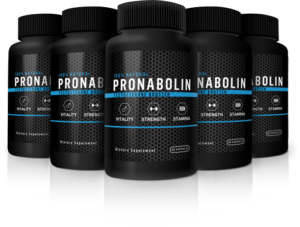 Pronabolin is a testosterone booster designed around a blend of several herbal extracts alongside a blend of digestive enzymes.
Pronabolin is a testosterone booster designed around a blend of several herbal extracts alongside a blend of digestive enzymes.
Does it really work? This will require an examination of the ingredients and the science behind their efficacy.
Ingredients
The core of Pronabolin is its blend of herbal extracts. The herbal blend includes tribulus terrestris, fenugreek, forskolin, milk thistle, eurycoma longifolia, horny goat weed, and black pepper extract.
These are complimented by a proprietary mixture of digestive enzymes that are supposed to enhance the activity of the herbal ingredients included in Pronabolin.
Our team tried and tested over 25 of the top testosterone boosters to find the best:
Click here for our #1 rated testosterone booster
Benefits
Whether or not this supplement works to boost testosterone and have the associated health effects of higher testosterone depends on the efficacy of its constituent ingredients.
The evidence for tribulus terrestris, an herbal extract long used as an aphrodisiac, is equivocal. On one hand, studies in rats appear to support its use for erectile dysfunction. In a 2008 study by Kalamegam Gauthaman and Adaikan P. Ganesan published in the scientific journal Phytomedicine, the two researchers studied the hormonal effects of tribulus terrestris in rats, rabbits, and primates (1). In primates, the most biologically similar animals to humans, the effects of the supplement were notable: a 52% increase in testosterone levels, which achieved statistical significance. The results in the other animals were less promising, but the net result was encouraging, according to the researchers’ conclusion.
On the other hand, a similar study in humans in the Journal of Ethnopharmacology was not as successful. Researchers V.K. Neychev and V.I. Mitev tested the influence of the tribulus terrestris supplement on 21 healthy young men over a period of four weeks. At the study’s conclusion, there was no increase in the men’s testosterone levels, nor was there an increase in testosterone-related precursors and other hormones (2).
A study on fenugreek seed extract had similarly disappointing results. As described by Brandon Bushey and other researchers at the University of Mary Hardin-Baylor in a 2009 study, fenugreek seed extract does not affect testosterone levels (X). In fact, it may even cause a drop in dihydrotestosterone, the more potent form of the hormone. Their study used 45 male weight-lifters, which is a fairly large sample size, so we would have expected to see a benefit if there was one.
Forskolin, on the other hand, has more encouraging research supporting its use. While it is mostly used as a weight loss supplement, one study investigating it for that purpose noted some effects on testosterone levels in overweight and obese men. A 2005 study by Michael P. Godard, Brad A. Johnson, and Scott R. Richmond studied the effects of forskolin on the body composition and hormone profile of 30 overweight and obese men (3). Over the course of twelve weeks, two groups of men received either 250 mg of forskolin or a placebo. By the study’s conclusion, the men taking forskolin had mild positive changes in lean body mass, but a more noticeable increase in serum testosterone levels. It remains to be seen whether this effect carries over into lean men, but evidence so far is good. Notably, however, the dosage of forskolin in Pronabolin is half that used in this study.
When it comes to horny goat weed, evidence is lacking. According to a review article by researchers at the University of Hertfordshire in the United Kingdom that looked at common ingredients in male sexual enhancement supplements, there are some animal model studies that appear to show an effect of horny goat weed at treating some conditions like erectile dysfunction, but there are no trials in humans (4).
With regards to milk thistle, the evidence is even weaker–there aren’t even animal model studies that have been conducted to support its use in increasing testosterone. Similar problems plague black pepper extract.
In contrast, a 2012 study by researchers in Malaysia found positive, promising results for Eurycoma longifolia extract. In their experiment, a supplement containing Eurycoma longifolia was able to ameliorate the low testosterone levels of 90% of men in a 76-person cohort with low testosterone (5). There was also a concomitant drop in complaints related to low testosterone, like lack of energy of energy, low sex drive, and erectile dysfunction. It’s important to note, however, that research on this herb is limited and difficult to compare because extraction and standardization techniques have not been established–not all studies use the same type of extract or the same concentration, so it’s hard to tell what the actual dosage is. Despite that, there is some evidence that Eurycoma longifolia can help with low testosterone levels.
While there are some interesting properties to the digestive enzyme blend, the bottom line is that they can only allow the included herbal extracts to be absorbed more effectively, not have independent effects on their own
Recap
Pronabolin is truly a mixed bag. Some of the ingredients, like black pepper extract and milk thistle, have no evidence supporting their use as a testosterone boosting supplement, making their inclusion questionable to say the least. Others, like horny goat weed, have mild evidence but nothing particularly convincing. Eurycoma longifolia and forskolin have actual research in humans supporting their use. Counterbalancing this are ingredients like fenugreek and tribulus terrestris, which have research in humans that’s found they are ineffective at influencing male testosterone levels.
Is this mixed bag worth it?
It’s not a terrible booster, but given the high price and the questions surrounding the efficacy of the ingredients, they are probably better options out there.
Click here for our #1 rated testosterone booster
https://bodynutrition.org/pronabolin/ http://bodynutritionorg.tumblr.com/post/171069785519
No comments:
Post a Comment